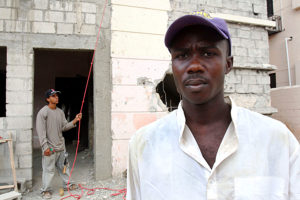
By EZEQUIEL ABIU LOPEZ Associated Press
For a dozen years, Romain Renelus has made his life in the Dominican Republic as a migrant laborer, working 12 hours a day to earn $235 monthly as caretaker at a condominium complex. A night job as a guard at another residential building provides $210 more each month to support his wife and two daughters back home.
Haitian workers such as Renelus have long been a mainstay of Dominican agriculture, construction and other low-wage industries. Hundreds of thousands of migrants have crossed the border in search of jobs in a country that is still poor, but better off than their homeland.
But new Dominican requirements for work permits worry the employers, the workers and their advocates, who say it will become harder and more expensive to hire Haitian laborers. An estimated 1 million Haitians live in the Dominican Republic, which has a population of about 10 million.
As an independent worker, the 40-year-old Renelus said he would seek to renew his visa and passport, both currently expired, because of an expected increase in the scrutiny of migrants. But he doesn’t think it will be easy: a new passport will cost $129 and a visa $200. Currently, no work permits exist, but migrant workers have to present an entry visa and proof of residency to legally work in the country.
“It is very hard for us to settle such expenses,” he said. “It’s a lot of money.”
Some migrant workers worry that their Dominican employers will deduct the costs of all the new paperwork, estimated to reach $800, from their paychecks. The new law does not stipulate whether the employer or employee would pay for the documents needed to obtain a work permit, including a visa, passport, birth certificate, a medical certificate and criminal background check. Any Haitian seeking a birth certificate is forced to return to Haiti to obtain it.
“This is going to be traumatic,” said the Rev. Mario Serrano, a Roman Catholic priest who provides assistance to migrants and refugees and studies labor issues as the director of the nonprofit Bono Center. “No one is going to be able to comply with these rules.”
The requirements took effect June 1, but the government says the rules won’t be enforced until month’s end. Employers will then have to have a work permit for each non-Dominican employee.
Human rights groups have long complained about Dominican immigration policies toward Haitians, calling on the country to revise deportation rules to ensure due process and avoid race-based discrimination. An extensive report on the issue by Human Rights Watch a decade ago described the historic tensions between the neighboring countries and the Dominican Republic’s deportations of suspected “Haitian-looking” people with darker skin.
Haitian Ambassador Fritz Cienas called on Dominican authorities last month to ensure the human rights of Haitian workers affected by the new work permit rules.
Creole-speaking Haiti and the Spanish-speaking Dominican Republic share the island of Hispaniola and a troubled history. Haiti invaded and occupied the Dominican Republic for more than 20 years in the 19th century and Dominican dictator Rafael Trujillo ordered the massacre of an estimated 20,000 Haitians in 1937 as he sought to remove them en masse from the country.
After Haiti’s 2010 earthquake, which the Haitian government says killed more than 300,000 people, the Dominican Republic halted deportations and the country became a staging ground for relief efforts. It was a rare break in tensions between the neighboring countries.
The new labor law adds to indications that the humanitarian lull has ended and the Dominican Republic has resumed its pre-quake policies. Advocates for migrants say authorities are cracking down on suspicious documents and have refused to accept work visas issued in previous decades. The children of Haitian migrants in many cases have been unable to obtain residency papers, preventing them from holding jobs or attending school, leaving them essentially stateless. As part of the new regulations, schools have been directed not to accept foreign children without residency permits.
Haitian workers, nevertheless, play an important role in the Dominican economy, with the migrants accounting for about 80 percent of all workers in Dominican rice fields and 60 percent of those in banana fields, according to the private Agrobusiness Board. Haitians also make up more than half of the country’s construction workforce, with nearly 60 percent of them lacking documents, according to a Labor Department study released in February.
Agrobusiness Board Vice President Osmar Benitez said two of the country’s largest growers have applied to legalize hundreds of employees in the past six months but obtained documents so far for only 42.
Migration Director Jose Ricardo Taveras said business owners will have one month to meet the new requirements, and he pledged that officials will not raid businesses to deport illegal migrants during that period. Taveras said the new rules are aimed at eliminating the “chaos generated by the current illegal status of the labor market that encourages foreign labor.”
Employers who do not comply will face between $1,500 and $7,900 in penalties, and they also will be required to ensure that all migrants return home once their contract expires.
The government has not said how it plans to enforce the new rules, but officials have already denied requests from business groups to delay enforcement.
Edwin Paraison, Haiti’s former minister of Haitians living abroad, said the Dominican government is rushing to enforce new regulations without first establishing an agreement with Haiti to possibly expedite the process of issuing documents such as passports and birth certificates. He also criticized Dominican officials for not advertising the new regulations.
“It’s inconceivable that they are launching a migration law without a media campaign in Creole,” he said. “This prevents many Haitian migrants who only speak that language from learning about the new migration regulations.”
Renelus said he was scrambling to get the necessary paperwork together, but it had been difficult. He said if he cannot meet the requirements, he’ll just go home.